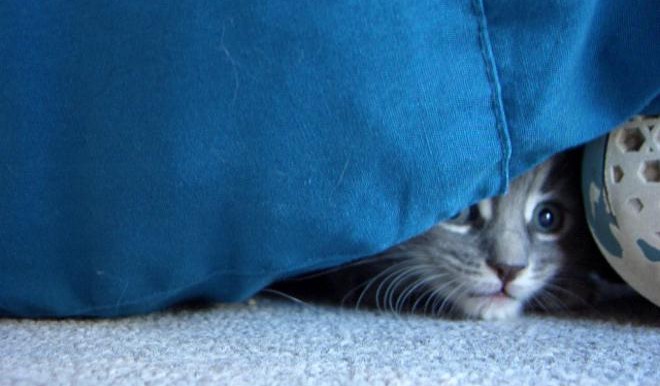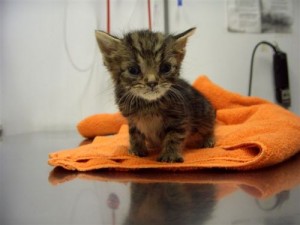
There is nothing cuter than a tiny new kitten, and it is our job to make sure that your little bundle of fluff stays happy and healthy until a ripe old age. Along with the joy of a frolicking little kitty comes responsibility, and we are here to help you through all of the trials and tribulations that may come your way. Here are some of the important topics we will be covering in those first few visits.
Vaccinations
Kittens need a series of vaccination boosters, generally given around 8, 12 and 16 weeks of age. We vaccinate all kittens for rhinotracheitis, calicivirus, panleukopenia, and rabies. If you expect that your kitten will be going outdoors, then we also vaccinate for feline leukemia. We will discuss your pet’s unique circumstances, and personalize a vaccine protocol that works for both you and your kitten.
Physical examination
A comprehensive and thorough physical examination will check for any common medical problems seen in kittens, such upper respiratory infections, ear mites, hernias, undescended testicles, and heart murmurs. We perform an examination at each and every one of your kitten’s health visits to ensure that he or she is continuing to grow right on schedule.
 Behavioural counselling
Behavioural counselling
Compared to puppies, kittens are relatively low maintenance, and learn to eliminate in the litter box quickly and easily. They do not have to go to obedience classes (they wouldn’t listen anyway) and they don’t need to be crate-trained.
They do, however, need to be trained not to tear your furniture apart. Cats have an evolutionary need to mark their territory, and they will do that by scratching their nails against any suitable vertical surface, including those brand new designer drapes you just had installed.
We will discuss how to train your cat to use a scratching post to the exclusion of your furniture.
Fecal testing
Fecal testing is done in all new kittens to ensure that they are free of parasites. Parasites can be quite common in young kittens, and can be acquired from the mother during gestation or from the mother’s milk shortly after birth.
Microchipping
Microchipping is a quick, easy and inexpensive way of being able to permanently identify your pet if he or she ever escapes. We recommend microchipping in all pets, because you never know what could happen. Administration is a piece of cake. Just a quick injection and it’s all over. We can do this at any time during your appointment, or schedule it to be done when your kitten comes in for spaying or neutering.
 Dental evaluation
Dental evaluation
Because cats have not been selectively bred for exaggerated features not normally found in nature (as have dogs), they have fewer dental problems in general. They can, however, have retained deciduous (baby) teeth, where the teeth do not fall out in time for the adult teeth to come in properly. This problem can push the erupting adult teeth into an abnormal position, and predispose the cat to dental problems later in life. This problem can easily be solved by extraction of the abnormal baby teeth when the condition is first identified.
Viral testing
Feline leukemia virus and feline immunodeficiency virus (feline AIDS) can have potentially devastating consequences. In addition to becoming infected from other cats, kittens can be born with these viruses if the mother was a carrier. We routinely test all kittens for these two viruses, usually at the same time that we are taking pre-anaesthetic blood before their spay/neuter surgery.
Spaying and neutering
Ovariohysterectomy (spay) or castration (neuter) is performed in all kittens, generally around five or six months of age (although it can easily and safely be done earlier if circumstances warrant). In addition to preventing unwanted pregnancy, these routine surgeries can help to prevent both medical and behavioural problems later in life.
